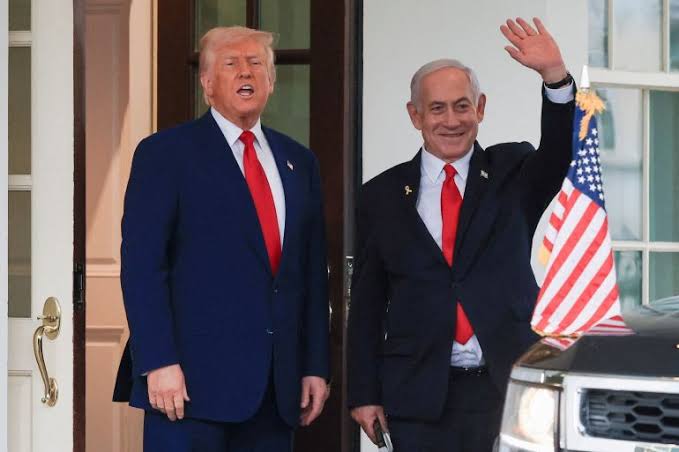Washington, July 8, 2025 — Israeli Prime Minister Benjamin Netanyahu has nominated U.S. President Donald Trump for the Nobel Peace Prize, hailing him as a peacemaker during a celebratory dinner at the White House that followed the leaders’ joint military strikes on Iran’s nuclear facilities.
“He’s forging peace as we speak, and one country and one region after the other,” Netanyahu said, presenting Trump with a nominating letter he plans to submit to the Nobel committee.
The White House gathering on Monday, attended by top aides, marked a rare moment of unity as both leaders declared their Iran operation an “unmitigated success.” The strikes, carried out last month, targeted three key Iranian nuclear sites with bunker-buster bombs and Tomahawk missiles.
Trump, who ordered the offensive, said he believes the operation has ushered in a new era in the Middle East. “I think things are going to be really settled down a lot in the Middle East. And, they respect us and they respect Israel,” he said.
Iran Nuclear Talks Still in Doubt
Trump claimed Iran has signaled its desire to resume nuclear talks, which collapsed after Israel’s strikes. “We have scheduled Iran talks, and they want to,” Trump told reporters. His envoy to the region, Steve Witkoff, suggested negotiations could begin as early as next week.
However, Iran has not confirmed any such plans. Iranian President Masoud Pezeshkian, speaking to conservative broadcaster Tucker Carlson, said U.S. strikes had so severely damaged Iran’s nuclear facilities that officials still couldn’t fully assess the destruction.
“We stand ready to have such supervision,” Pezeshkian said, referring to potential cooperation with the UN nuclear watchdog. “Unfortunately, as a result of the United States’ unlawful attacks against our nuclear centers and installations, many of the pieces of equipment and the facilities there have been severely damaged.”
Focus Shifts to Gaza Ceasefire
Even as both leaders touted their success against Iran, their talks were shadowed by Israel’s ongoing war against Hamas in Gaza, now in its 21st month. Trump has increasingly pushed Netanyahu to accept a U.S.-backed ceasefire proposal aimed at ending the fighting, which has killed more than 57,000 Palestinians and fueled Israel’s international isolation.
White House officials hope the proposal, currently under discussion between Israel and Hamas, could secure a 60-day halt in hostilities, facilitate humanitarian aid, and secure the release of at least some of the 50 hostages still held in Gaza.
Netanyahu met on Monday with Witkoff and Secretary of State Marco Rubio before his dinner with Trump and is scheduled to meet Republican House Speaker Mike Johnson on Tuesday.
Witkoff plans to travel to Doha, Qatar, later this week for further talks. However, negotiations remain complicated. Hamas insists any ceasefire must end the war entirely and secure Israel’s withdrawal from Gaza. Netanyahu, by contrast, has maintained that fighting will continue until Hamas surrenders, disarms, and its leadership leaves Gaza—terms Hamas rejects.
“We’ll work out a peace with our Palestinian neighbours, those that don’t want to destroy us,” Netanyahu said. “We’ll work out a peace in which our security, the sovereign power of security, always remains in our hands.”
Trump, who has previously influenced Netanyahu’s decisions with pressure from Washington, suggested he remains cautiously hopeful. Asked last week whether he believed a ceasefire was imminent, Trump said, “I’m very optimistic—but you know, look, it changes from day to day.”
Trump and Netanyahu Closer Than Ever
The dinner underscored the increasingly close alignment between the two leaders, who have not always seen eye-to-eye. During Netanyahu’s visit to Washington in April, Trump surprised the Israeli leader by announcing new talks with Iran, throwing cold water on any immediate Israeli military plans.
Since then, however, Trump’s support for Israel’s military operations, particularly the strikes on Iran’s nuclear facilities, has cemented their cooperation. Analysts say this newfound alignment could make it harder for Netanyahu to resist American pressure on Gaza.
“Trump thinks that Netanyahu owes him,” said Eytan Gilboa, a U.S.-Israel affairs expert at Bar-Ilan University near Tel Aviv. “And if Trump thinks that he needs to end the war in Gaza, then that is what he will need to do.”
Trump has also intervened in Netanyahu’s domestic affairs, recently calling for the Israeli leader’s corruption trial to be canceled—a gesture that could further deepen Netanyahu’s political dependence on Washington.
Netanyahu Nominates Trump for Nobel as Leaders Celebrate Iran Strikes and Eye Gaza Ceasefire

